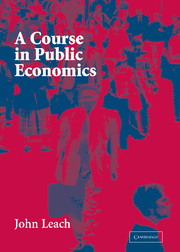Book contents
- Frontmatter
- Contents
- List of Figures
- Preface
- 1 Introduction
- Markets
- Externalities
- Public Goods
- 10 Pure Public Goods
- 11 Two Examples of Pure Public Goods
- 12 Impure Public Goods
- 13 The Link between Public Goods and Externalities
- Imperfect Competition
- Taxation and Efficiency
- Asymmetric Information and Efficiency
- Asymmetric Information and Income Redistribution
- A Note on Maximization
- References
- Index
11 - Two Examples of Pure Public Goods
from Public Goods
Published online by Cambridge University Press: 06 July 2010
- Frontmatter
- Contents
- List of Figures
- Preface
- 1 Introduction
- Markets
- Externalities
- Public Goods
- 10 Pure Public Goods
- 11 Two Examples of Pure Public Goods
- 12 Impure Public Goods
- 13 The Link between Public Goods and Externalities
- Imperfect Competition
- Taxation and Efficiency
- Asymmetric Information and Efficiency
- Asymmetric Information and Income Redistribution
- A Note on Maximization
- References
- Index
Summary
Even if there were very few pure public goods of any importance, their properties would be worth investigating. Actual goods vary in the degree to which they are excludable and rivalrous. The private good (excludable and completely rivalrous) and the pure public good (non-excludable and completely non-rivalrous) mark the limits of this variation, and for that reason alone, pure public goods would be worth studying. But there are pure public goods that are of far greater consequence than lighthouses. This chapter examines two of them.
KNOWLEDGE
Knowledge is a pure public good: once something is known, that knowledge can be used by anyone, and its use by any one person does not preclude its use by others. As an example, our use of calculus to study economics does not prevent millions of other people from simultaneously applying calculus to entirely different problems in industry and science. Or consider penicillin. Each unit of penicillin is a private good, requiring scarce resources to produce and available for the treatment of just one patient, but the knowledge of penicillin's antibiotic properties, and of the methods of producing it cheaply, is a public good. Possession of this knowledge means that an infected scratch need no longer lead to death.
Public goods are generally divided into two categories, public consumption goods and public factors of production. These categories are not mutually exclusive.
- Type
- Chapter
- Information
- A Course in Public Economics , pp. 171 - 186Publisher: Cambridge University PressPrint publication year: 2003



